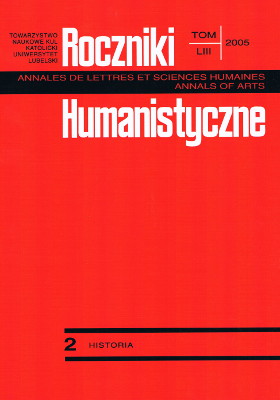Działalność władz szkolnych oraz kierowników szkół w powiecie tarnowskim w zakresie szkolnictwa powszechnego w latach 1918-1939
Abstrakt
The District School Council in Tarnów began its work on 1 July 1921. School Inspectors Jan Szumski, Jan Lubowiecki, Leon Grabowiecki, Stefan Mucha and Franciszek Tomaszkiewicz were its subsequent chairmen. The duties of subinspectors were carried out by Leon Staranka and Henryk Zahaczewski.
School inspectors were the first instance authority in the school district. Their duties included supervising the elementary education and managing it by forming the school network, watching over the children to make them carry out their school duties, and appointing temporary teachers. They were not only responsible for the standard of teaching but for the level of education as well. They also supervised private elementary schools. As part of their supervising activities the inspectors visited schools; they also controlled and discussed a variety of questions connected with didactic and educational work of the schools. The aim of the visits was to check the standard of work and of functioning of elementary schools. During the visits the inspectors were supposed to pay attention to: carrying out the school's statute tasks, the proper way of teaching the curricula and educating the pupils, and observance of the law regulations.
Apart from the questions connected with didactics and education, also problems connected with organization of work, a proper order in the schools, school documents and the pupils' attendance were subject to the inspectors' attention. These were the questions that the inspectors assessed when their visits to schools had a different form. In order to examine a particular problem, eg. that of attendance, inspectors carried out the so-called inspections.
School inspectors also very often undertook activities aimed at perfecting the teachers' skills. They organized meetings, conferences and courses. They participated in the qualifying exams for teachers. School inspectors were responsible for organization, state and efficiency of additional training for public schools headmasters and teachers.
School inspectors' work in the district was, on the whole, favorably viewed by teachers. Knowing the school realities they were able to offer help suitable for the needs and the real conditions obtaining in schools. When analyzing the reports of the teaching staff conferences it can be noticed that the inspectors were able to point to both the good sides of the work of schools and teachers, and to their mistakes. Putting forward recommendations they accurately pointed to the origin of the committed mistakes and the ways they could be mended.
Local school councils played an important role in the school circles. Most councils carried out their duties in the way that was favorable for the school. Apart from matters that were important for the functioning of the schools, local school councils often made decisions about seemingly trivial problems.
The headmasters played an important role in theirs schools. They headed the elementary schools and represented them. The headmaster's fundamental task was contributing, as far as he could, to general education. In that period, which was so difficult for education, a decided majority of headmasters in the district showed managing skills, knowledge of both their work and methods to do it, and the ability to establish contacts with the parents and the local circles. It was owing to them that schools could work normally to a certain degree, even though they were teaching and educating children often in extremely bad material conditions. The headmasters had to show especially much patience when fixing problems connected with the material basis. The difficult economic situation of the parents and of the local authorities caused that schools were often considered to be unnecessary.
The managing staff of most schools in the district showed organizing skills, a profound knowledge, both methodic and factual as well as knowledge of the law regulations and a lot of pedagogical tact.
Bibliografia
Gomoła R., Szkoła podstawowa nr 10 im. Romana „Sybiraka” Sanguszki, Tarnów 1998.
Juśko P., Szkolnictwo powszechne w Tuchowie w okresie międzywojennym, Lublin 2003 (praca magisterska – maszynopis).
Łabno J., Szkoła podstawowa im. Marii Konopnickiej w Tarnowie (1879-1979), Tarnów 1979.
Ruta Z., Szkolnictwo średnie i powszechne, w: Tarnów Dzieje miasta i regionu, t. II, red. F. Kiryk, Z. Ruta, Tarnów 1983, s. 550-559.
Winczura Ł., Minął wiek Z dziejów szkoły imienia Stanisława Konarskiego w Tarnowie, Tarnów 2000.
Copyright (c) 2005 Roczniki Humanistyczne

Utwór dostępny jest na licencji Creative Commons Uznanie autorstwa – Użycie niekomercyjne – Bez utworów zależnych 4.0 Międzynarodowe.





